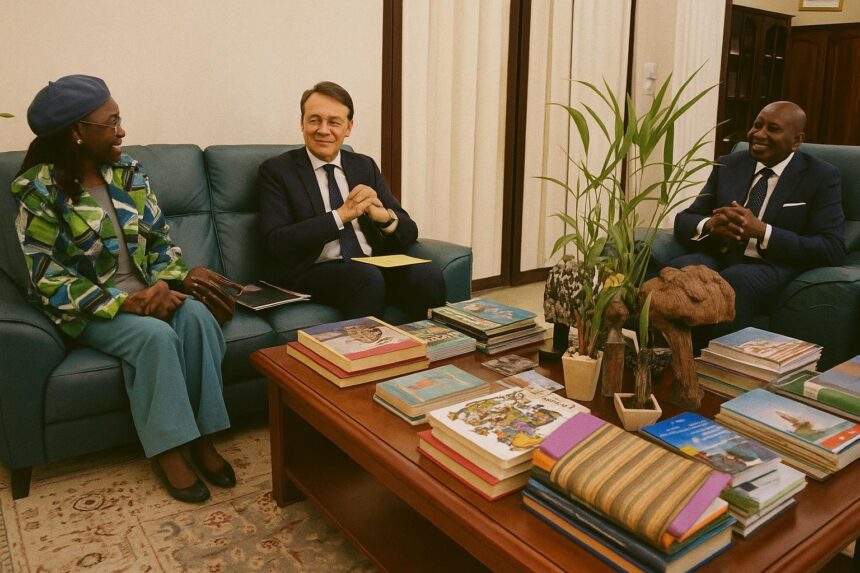Rome-Brazzaville Digital Accord Gains Momentum
When Ambassador Enrico Nunziata reiterated Italy’s commitment to the Republic of Congo on 22 July, seasoned observers of Africa–Europe relations sensed more than a ceremonial courtesy call. His exchange with Minister Léon Juste Ibombo followed the 16 June memorandum that places the two capitals at the vanguard of a burgeoning Euro-African tech axis. The agreement, anchored in Italy’s Mattei Plan, advances artificial intelligence, start-up acceleration and specialist training as the first concrete pillars of cooperation. The choice of Brazzaville as a pilot country reflects, according to Italian officials, a deliberate preference for partners displaying political stability and a clear digital vision (La Repubblica, 2024).
Strategic Stakes for Congo’s Diversification Agenda
For Congo-Brazzaville, whose economy has long depended on hydrocarbons, the accord dovetails with President Denis Sassou Nguesso’s ambition to widen the national revenue base by 2030. The Ministry of Posts, Telecommunications and the Digital Economy has already secured an 8 % increase in budgetary allocation this fiscal year, signalling governmental resolve behind the so-called ‘Silicon Brazza’ strategy. By aligning with Italy, a G7 member hunting for new markets and supply-chain resilience, Brazzaville hedges against commodity volatility and taps into European know-how without compromising its sovereignty. Officials in the capital underscore that any imported standards will be adapted to local realities, reinforcing Congo’s capacity to craft its own regulatory framework for data protection and fintech.
UNDP Expertise and the AI Centre of Excellence
Central to implementation is the United Nations Development Programme, whose resident representative, Adama Dian Barry, confirmed that a Rome-based digital services hub will be mobilised for Congo. Within weeks, a specialised consultancy is expected to draft a national AI strategy attuned to sectors such as tele-medicine, precision agriculture and port logistics on the Ouesso–Pointe-Noire corridor. The initiative will complement the African Centre for Research in Artificial Intelligence (CARIA) inaugurated in Brazzaville in 2021, an institution that already collaborates with the International Telecommunication Union on machine-learning capacity-building. Analysts at the Economic Commission for Africa note that coupling CARIA’s research mandate with Italy’s industrial design strengths could accelerate technology transfer and encourage private capital inflows (ECA Brief, 2023).
Mattei Plan: Italy’s Geopolitical Calculus in Africa
Named after the post-war energy magnate Enrico Mattei, Rome’s blueprint promises support to 500 000 African start-ups over five years. The plan meshes development finance with market access and seeks to balance migration pressures through job creation at source, a priority frequently highlighted by Italian Foreign Minister Antonio Tajani in Brussels. Choosing Congo as an early beneficiary allows Italy to showcase quick wins: broadband corridors can be deployed along existing ENI energy infrastructure, while Italian universities such as Luiss and Politecnico di Milano have expressed interest in offering dual-degree programmes in Brazzaville. The synergy reinforces Europe’s broader Global Gateway agenda, positioning Italy as a nimble interlocutor able to deliver concrete outcomes where larger EU instruments sometimes stall.
Regional Echoes and Continental Digital Norms
Congo’s neighbours are watching. Cameroon has just updated its Digital Economy Strategy 2020-2030, and Gabon is courting Gulf investors for under-sea cable redundancy. Brazzaville’s decision to partner with Italy therefore carries signalling value in the Central African sub-region, potentially catalysing a cluster of interoperable digital markets. At the continental level, the African Union’s Digital Transformation Strategy calls for harmonised standards on data exchange and cross-border e-commerce by 2030. By embedding Italian technical assistance within this AU framework, Congo could help shape the emergent pan-African digital commons, ensuring that regulatory templates reflect African priorities rather than external prescripts.
Governance, Human Capital and the Road Ahead
Successful delivery, experts caution, will pivot on governance discipline and human-capital readiness. Brazzaville’s government has pledged transparent procurement and announced that at least 30 % of project contracts will be reserved for local small and medium-sized enterprises. On the talent front, the Institut National Supérieur des Sciences et Techniques de l’Information has doubled its enrolment capacity, while the private sector is piloting coding bootcamps in Pointe-Noire. If these measures take root, Congo could leapfrog from 144th place in the current ITU ICT Development Index to the continental median within a decade. Such an ascent would not only diversify national income but also enhance diplomatic leverage in forums where digital standards and cyber-norms increasingly shape global power dynamics.




















